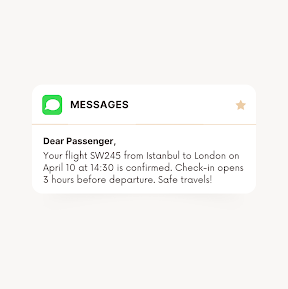Still relying solely on traditional call centers or email? Then you might be missing out on the channels your customers actually prefer — messaging apps like WhatsApp, Messenger, Instagram DM, and more.
Whether you’re just starting to explore these tools or already using some, one thing is clear: Today’s customer support must be fast, convenient, and personal.
And messaging apps deliver all three — right in the palm of your customer’s hand.
Let’s explore how messaging is transforming customer service, the platforms leading the way, and how you can unlock its full potential with tools like Click2Connect.
Why Customers Prefer Messaging Over Traditional Support Channels?
Let’s flip perspectives. Imagine you’re a customer. You’re in a hurry and just need a quick answer — what would you prefer?
Chances are, you’re not opening your email app. You’re reaching for WhatsApp or Messenger. Here’s why:
⚡ People expect real-time answers.
Nobody likes to wait for minutes. If you’re at work, in a noisy place, or in a hurry, texting is much easier. For this reason, customers want to reach the agent with a simple app and start real-time chat immediately.
📱 Everyone uses messaging apps.
Let’s be honest, who doesn’t have WhatsApp on their phone? They’re second nature — these platforms are already part of customers’ daily routines. There’s no learning curve.
🎯 Messaging doesn’t demand full attention
People don’t want to leave all their work just to make a call. Messaging allows customers to get support while working during the day, commuting to and from work, or even while watching Netflix. It fits into their lives — not the other way around.
💬 They are non-intrusive and comfortable
Some people simply prefer typing to talking. Messaging gives users the time to think and respond without pressure. For introverted or busy customers, that’s a huge plus.

The Benefits of Using Messaging Apps for Customer Service
Now, let’s flip the lens. Why should businesses invest in messaging-based support?
1. Wider Customer Reach
Messaging apps have 3 billion active users. This makes them a great choice for customer communication. You can also respond to people in different countries through these apps. For example, WhatsApp operates in over 180 countries.
2. Instant, Scalable Support
Customers are more satisfied when they get quick and easy solutions. By offering 24/7 support through messaging apps, you can respond instantly to customers’ needs and handle multiple conversations at once. This boosts customer satisfaction.
3. Reduced Operational Costs
Compared to traditional voice support, messaging is more efficient. One agent can manage several chats at the same time, improving productivity and lowering costs without sacrificing service quality.
4. Higher Engagement and Loyalty
Messaging apps allow you to interact more personally with your customers. By sending proactive notifications and promotional content, you can stay in constant touch with them. This helps build customer loyalty and fosters long-term relationships.
5. More Personalized Interactions
Messaging allows brands to create human-like, one-on-one conversations — something not always possible via email or even calls. You can greet users by name, suggest products, or share order updates directly in the chat.
Popular Messaging Platforms for Business
The top messaging platforms businesses use for customer service:
- WhatsApp for Business – According to the latest data in 2023, 200 million businesses use WhatsApp Business. But in 2020 it was only 20 million.
- Facebook Messenger Support – Approximately 1 billion people use Messenger. This is a figure that should not be ignored.
- Instagram DM & Telegram – Brand engagement is 10 times higher on Instagram than on Facebook.
- SMS Customer Support – Popular but not as effective as WhatsApp. Good for the elderly and people who don’t use other apps.

How Click2Connect Integrates Messaging into Customer Support?
Click2Connect simplifies multi-channel customer support with 10+ integrations.
What does it do?
- Unifies WhatsApp, Messenger, and SMS under one platform.
- Provides automated responses & chatbot integration.
- Offers analytics tools to measure customer service performance.
It’s also highly customizable. So you can tailor it to your business needs.
Explore advanced features like browser-based calls, modern widgets, and AI-powered automation today!
🚀 Click2Connect: One Click to Better CX.
Case Studies: Brands Winning with Messaging Apps
Examples of brands using messaging apps in customer service. 👇🏻
Indigo Airlines
One of India’s top airlines, Indigo uses WhatsApp to share flight updates, gate changes, and ticket confirmations, ensuring passengers stay informed in real time.
Orion Mall
Orion Mall deployed a WhatsApp chatbot to provide event schedules, promotions, and visitor information — driving higher footfall and engagement.
The Future of Messaging in Customer Communication
What’s next for messaging in customer service? The answer lies in AI and hyper-personalization.
Imagine a beauty brand with a chatbot that gives personal skincare recommendations. Or a restaurant offering menu previews, reservations, and reviews — all through WhatsApp.
As generative AI advances, businesses can offer context-aware support that adapts to individual preferences, behavior, and tone.
And customers are ready for it. They don’t just want fast responses — they want relevant, human-like conversations. Messaging apps, when combined with AI, make that future possible.
Key takeaways
For businesses, adapting to this shift is not optional—it’s an opportunity to stay ahead of the competition.
Speed, convenience, and personalization matter more than ever. Businesses that embrace messaging apps aren’t just improving support—they’re building stronger, lasting customer relationships.
Want to future-proof your support with AI and messaging? Discover how Click2Connect can help you deliver instant, personalized support at scale.






